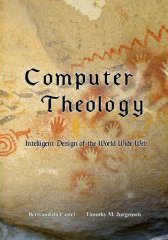|
actually provides the
loom. The subsequent set of laws that derive from it form one axis of social
interaction, while a moderately regulated and very strongly supported
enterprise market system provides the orthogonal axis. It seems reasonable to consider
whether these foundational properties are related to a fertile environment for
the innovation of computer systems, particularly computer software. So, we have
suggested the metaphorical image of the loom, of the warp strands and of the
woof strands; but, for the moment, we’ll defer the question just who the weaver is. Suffice it to
recognize that from this seminal cloth has sprung a cyber-extension to the
social fabric in the form of the Internet. In turn, the ubiquitous network has
been further enhanced by its cognitive big brother, the World Wide Web. The Web reiterates a European invention that
bloomed in the technology business environment set by the United States. More succinctly stated, we put forth
the hypothesis that the two main components of the success within the United States of computer systems in general, and
software systems specifically are a particular form of democracy and
capitalism. If this is correct, it is natural to extend our hypothesis to the
local development of protestant Christianity, the common thread to both social
systems. It is important to understand that these harbingers to successful
software are not based in genetic differences; to the extent of current
research, there are no software genes; software jeans, perhaps. Many of the
software companies created and flourishing in the United States are in fact developed by recent
immigrants, who find in the country the ferment they need. Innovation and
development derives from the social substrate of the society, and religion in
all its guises is a principal characterization of this substrate.
One might
rightly ask, “How can this be the case, when democracy is also subscribed to in
other countries, which in many cases are under other than significant
protestant Christianity influence?” For example, Japan adopted the concept of democracy from
the West explicitly after the Meiji restoration, and extended it to a
constitutionally based system during the Allied occupation following World War
II. Certainly, Christianity was not and is not a dominant religious influence
in Japan. And, we would note, while Japan has
reached an eminent position in design, engineering and manufacturing of
hardware systems, in particular, high quality hardware systems, it was not
successful at taking the step to software dominance with its Fifth Generation
endeavor in the eighties. Japan’s software prowess has been limited to
games and aspects of robotics, with local development the norm. Another counter
example that one might suggest is India. It is currently the world’s largest
democracy; and, it is certainly noteworthy that India has an emerging position of significant
strength in the computer software development world. However, at the present
time, this strength builds largely upon services to the computer world of the United States, and not in the emergence of major
computer and software product companies. The only two major software companies
based outside the United States that have excelled in the past 40 years are
French Dassault Systèmes (with their CATIA design program) and German SAP (with
their business software). Even so, CATIA found its original expansion through
IBM marketing in the seventies. This compares to hundreds of dominant computer
and software companies in the United States during the same 40 years period.
Finally, we need to mention the United Kingdom. A number of advances in computer
science came from the UK, in particular in the theoretical realm,
for example the seminal work of Alan Turing. Why is it that the UK didn’t develop a sizeable computer and
software business? Is it in the name: Kingdom? If we observe that the Church of
England is still under the ultimate direction of the Queen, and we compare it
to the myriad of competing churches in the United States, might we understand how the equally
competing situation of software businesses flourished in the market of ideas?
So, we wonder
whether the convergence of a constitutional social union and an opportunistic
business melee is the ferment on which computer systems and software products
could optimally build. Reiterating that many computer-related ideas and
innovative concepts, for example,
|
